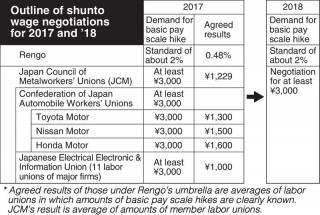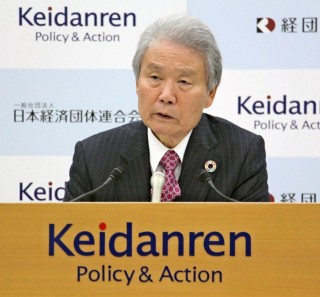Loading
Search
▼ Metal Unions Request Moderate Hikes
- Category:Other
The Japan Council of Metalworkers’ Unions (JCM) is coordinating its member labor unions’ joint demand for a basic pay scale hike at ¥3,000 or more a month in the shunto annual spring labor-management wage negotiations in 2018.
JCM comprises major industrial federations of labor unions of such companies as automakers and electronics manufacturers.
Business performance in the industrial sectors is brisk, and there has been an increasingly serious labor shortage. Partly because of uncertain factors in the world economy, however, JCM aims to keep the level of the pay hike demands the same as during the 2017 shunto.
“It’s important to regain the common sense that wages naturally rise,” said Rikio Kozu, president of the Japanese Trade Union Confederation (Rengo), at a meeting of Rengo’s Central Committee on Tuesday.
SMBC Nikko Securities Inc. recently calculated business results for 1,305 companies, excluding financial institutions — most of the companies that are listed on the First Section of the Tokyo Stock Exchange and close their business year in March.
The results showed that their total sales in mid-term account settlements as of the end of September 2017 rose 8.3 percent from a year ago. Their total operating profit, which indicates profits from their core businesses, rose 14.8 percent to a record high of about ¥19 trillion.
Sony Corp. set a new record for its operating profit for the first time in 20 years. Mitsubishi Electric Corp. and Hitachi Ltd. also saw record-high net incomes.
Toyota Motor Corp. and Honda Motor Co. revised upward their projections for the business results as of the end of March 2018.
Gaps among industries
However, an increasing number of labor unions plan to keep their pay hike demands at the same level as the previous year.
Rengo has officially decided on a shunto policy under which member labor unions will demand a basic pay scale hike of about 2 percent as a standard, with the final hike rate being about 4 percent after combining amounts from annual regular pay hikes.
Rengo appears to be paying consideration to the fact that business performance differs among industrial sectors. It has therefore kept its demand at the same level as previous shunto negotiations for three years in a row.
JCM is also keeping its uniform demand for basic pay scale hikes at the same level as previous year, and intends to demand ¥3,000 or more per month.
UA Zensen, which encompasses labor unions of distributor companies, textile companies and others, also compiled a draft of shunto demands that member unions will ask for a hike of about 2 percent in the basic pay scale. The demand level will be the same for three years in a row.
Labor unions will not raise their demand levels, despite their brisk business performance, because they are concerned that wage gaps may widen between major companies and small and midsize ones. They also took into consideration the fact that many companies are concerned about the future conditions of overseas economies.
A source in a major company’s labor union said, “Some labor unions want to demand more, but they put priority on taking concerted action.”
The Japan Business Federation (Keidanren) has presented a policy to call on member companies to raise pay by about 3 percent. This is in line with a request from Prime Minister Shinzo Abe, who urged business leaders to realize pay hikes of 3 percent.
It is unusual for Keidanren to present concrete numbers when asking member companies to raise wages.
Series of wrongdoing
The series of revelations since September in which leading Japanese companies were found to have been engaged in wrongdoing involving the quality of their products has led to concerns over whether the pay hikes will be realized.
At Nissan Motor Co., it was revealed that unqualified workers were involved in final vehicle inspections in Japan. As a result, the company revised downward its projection of operating profit as of the end of March 2018 by ¥40 billion.
Product quality data was found to have been falsified at Kobe Steel Ltd. The company presented its forecast for net income as of the end of March 2018 as undecided.
Mitsubishi Materials Corp., where falsification of product quality data was discovered, said the effects on business performance were unknown.
Labor unions will not raise their demand levels, despite their brisk business performance, because they are concerned that wage gaps may widen between major companies and small and midsize ones. They also took into consideration the fact that many companies are concerned about the future conditions of overseas economies.
A source in a major company’s labor union said, “Some labor unions want to demand more, but they put priority on taking concerted action.”
The Japan Business Federation (Keidanren) has presented a policy to call on member companies to raise pay by about 3 percent. This is in line with a request from Prime Minister Shinzo Abe, who urged business leaders to realize pay hikes of 3 percent.
It is unusual for Keidanren to present concrete numbers when asking member companies to raise wages.
Series of wrongdoing
The series of revelations since September in which leading Japanese companies were found to have been engaged in wrongdoing involving the quality of their products has led to concerns over whether the pay hikes will be realized.
At Nissan Motor Co., it was revealed that unqualified workers were involved in final vehicle inspections in Japan. As a result, the company revised downward its projection of operating profit as of the end of March 2018 by ¥40 billion.
Product quality data was found to have been falsified at Kobe Steel Ltd. The company presented its forecast for net income as of the end of March 2018 as undecided.
Mitsubishi Materials Corp., where falsification of product quality data was discovered, said the effects on business performance were unknown.
- December 7, 2017
- Comment (0)
- Trackback(0)



